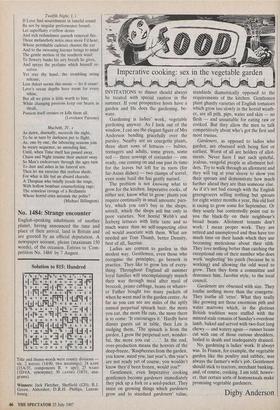Imperative cooking 0L) : sex in the vegetable garden
. .7
n...114Lik..; ,:"LigaLAPLJ INVITATIONS to dinner should always be treated with special caution in the summer. If your prospective hosts have a garden and He does the gardening, be- ware.
Gardening is ladies' work, vegetable gardening anyway. As I look out of the window, I can see the elegant figure of Mrs Anderson bending gracefully over the parsley. Nearby are six courgette plants, three short rows of lettuces — babies, teenagers and adults, some green, some red — three sowings of coriander — one ready, one coming on and one past its time, for the leaves but left for its roots (for far-Asian dishes) — two clumps of sorrel, even some basil she has gently nursed.
The problem is not knowing what to grow for the kitchen. Imperative cooks, of either sex, know what to grow: plants you require continually in small amounts: pars- ley, which you can't buy in the shops; sorrel!, which the shops sell but only in poor varieties. Not horrid Webb's and Iceberg lettuces with little taste and so much water than no self-respecting olive oil would associate with them. What are needed are Tom Thumb, better Density, best of all, Sucrine.
Ladies are content to garden in this modest way. Gentlemen, even those who recognise the principles, go berserk in practice. They like to grow lots of every- thing. Throughout England all summer loyal families will uncomplainingly munch their way through meal after meal of broccoli, primo cabbage, beans or whatev- er Father bought too many packets of when he went mad in the garden centre. As far as you can see are miles of the aptly named perpetual spinach beet: the more you eat, the more He cuts, the more there is to come: 'It encourages it.' Hardly have dinner guests sat at table, then Len is nudging them, 'The spinach is from the garden, I grow the perpetual sort, wonder- ful, the more you cut . . In the end, over-production means the horrors of the deep-freeze, 'Raspberries from the garden, you know, mind you, last year's, this year's are not ready yet of course, you wouldn't know they'd been frozen, would you?'
Gentlemen, even Imperatiye cooking gentlemen become gardeners immediately they pick up a fork or a seed-packet. They insist on growing things which gardeners grow and to standard gardeners' value, standards diametrically opposed to the requirements of the kitchen. Gentlemen plant ghastly varieties of English tomatoes which grow too slowly in the horrid weath- er, are all pith, pips, water and skin — no flesh — and unsuitable for eating raw or cooked. But they allow the men to talk competitively about who's got the first and most trusses.
Gardeners, as opposed to ladies who garden, are obsessed with being first or earliest. Worst of all are holders of allot- ments. Never have I met such spiteful, jealous, vengeful people as allotment hol- ders. Try to walk through an allotment and they will tug at your sleeve to show you their sprouts and demonstrate how much further ahead they are than someone else. As if it's not bad enough with the English greengrocers selling nothing but sprouts for eight winter months a year, this old fool is racing to grow some for September. Or they sourly but contentedly point out to you the black-fly on their neighbour's broad beans. Allotment tenants don't work: I mean proper work. They are retired and unemployed and thus have too much time on their hands which they use becoming meticulous about their tilth. They love nothing better than catching the exceptional one of their number who does work 'neglecting' his patch (because he is working) and allowing the odd weed to grow. Then they form a committee and denounce him, Jacobin style, to the local council.
Gardeners are obsessed with size. They loathe nothing more than the courgette. They loathe all 'ettes'. What they really like growing are those enormous pith and water marrows which, in the glorious British tradition were stuffed with the minced stale remains of Sunday's overdone lamb, baked and served with two-foot long chewy — and watery again — runner beans cut with one of those curious shredders, boiled to death and inadequately drained.
No, gardening is ladies' work. It always was. In France, for example, the vegetable garden like the poultry and rabbits, was always the farmer's wife's job. Gentlemen should stick to tractors, merchant banking, and, of course, cooking. I am told, howev- er, that certain sorts of homosexuals make promising vegetable gardeners.
Digby Anderson


















































 Previous page
Previous page